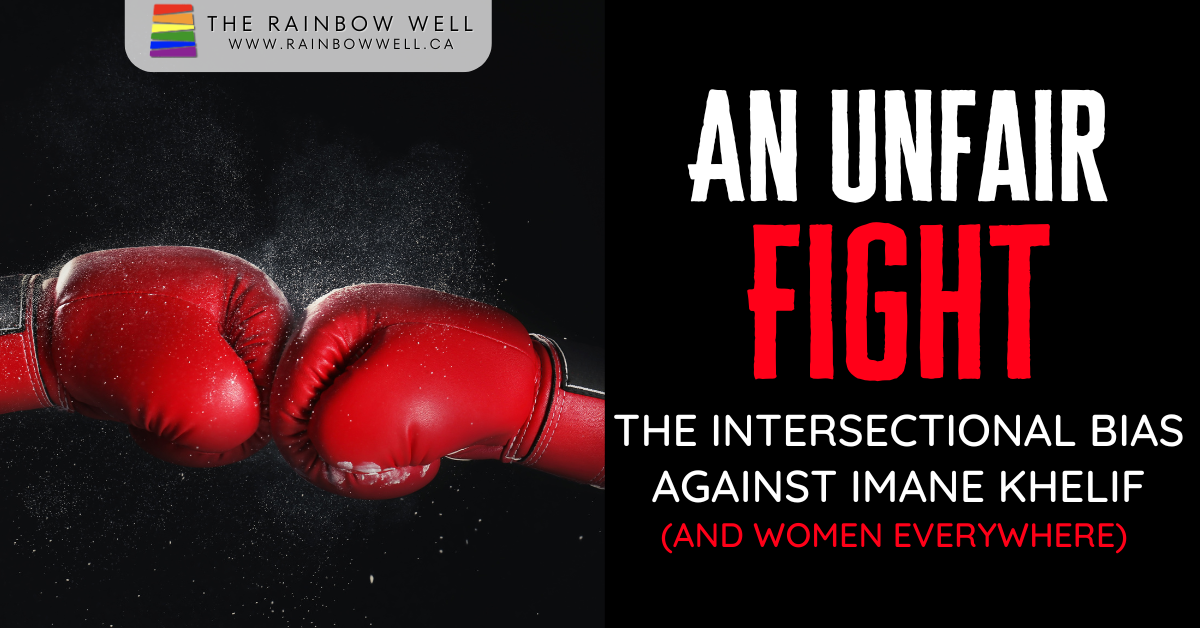An Unfair Fight

If you have been following the Olympics at all (or have been on social media), you will have heard about the controversy surrounding Algerian boxer, Imane Khelif. In her welterweight fight against Angela Carini (Italy), it was only 46 seconds before the Italian had to stop, following a powerful punch to the nose. In what should have been a case of a gifted and powerful boxer winning a decisive bout, it sadly became an instant controversy fueled by transphobia, racism, misogyny, and ignorance.
Almost immediately, there were cries of protest from people claiming Khelif had no right to be in the ring, with one of the most common (and false) reasons given being that she was a transgender woman. Others argued that while she may have been “born a woman”, her uncommonly high testosterone levels should have disqualified her from fighting (as the largely discredited International Boxing Association did in a move still considered arbitrary controversial). And mixed into all of this- sometimes explicit, other times cloaked in a thin veil of innuendo- racist commentary can be found.
So let’s start by getting the facts on the table:
First, Khelif is a cisgender woman (assigned female at birth) born in a country where being transgender and receiving related gender-affirming care are legally forbidden and socially taboo. She met all the qualification standards to compete in the Olympics that every athlete is subject to. (In fact, she competed in the previous summer games but did not medal.) And to those who demand that these facts be proven- usually through violent and demeaning means- unless every athlete is subject to this violation, how is that remotely fair? And even then, if she had been a trans woman, she would still be a woman.
Second, the Olympic qualifications standards do not require Khelif’s- or any athlete’s- naturally elevated testosterone level to be disqualified. While other sporting organizations have attempted to implement such standards, they are not in place in this case. Further, even where they are used, it becomes problematic because establishing standards of acceptable biological deviation has not only been largely arbitrary but also inconsistently applied.
Take for example swimmer Michael Phelps, the most decorated Olympic athlete of all time, boasting a total of 28 medals. It is commonly acknowledged that Phelps has physiological advantages that have made him such a formidable swimmer. Specifically, he has an exceptionally long wingspan, large feet that function like flippers, and a highly flexible double-jointed body, which allows for more efficient strokes. Most significantly, his body produces less lactic acid, reducing muscle fatigue and enabling quicker recovery. These are all natural, biological advantages over other swimmers. Yet there is virtually no controversy over his being qualified for competition beyond demands he be screened for “doping”.
Third, while some reports have said that Khelif has XY chromosomes, this would still not mean she is a man. Cisgender women can have XY chromosomes under circumstances such as Androgen Insensitivity Syndrome and Swyer Syndrome. These conditions show that biological sex can be complex and not always align with chromosomal patterns. Again, given Algeria’s strict legal and cultural rules around gender, their insistence on her being a woman is further evidence that she is cisgender. (And again, even if she were trans, her womanhood would be fully valid.)
Fourth, Khelif’s boxing record reflects a pattern of wins and losses consistent with other athletes who work hard to establish themselves in their given sport. For example, catching the attention of Algeria’s national team when she was younger, she finished her first major tournament with a first-round loss. She lost five of the first six bouts she competed in at the elite level. However, she has persevered and earned her place as one of the best women boxers in the world.
This is not stated as proof of Khelif’s gender, as many women could arguably defeat many men in fair fights. Rather, the point is that Khelif’s career defies the growing false narrative that she is a testosterone-fueled, unstoppable punching machine that is making a mockery of women’s boxing. This is demonstrably untrue, exposing more nefarious intentions behind the outrage against her.
It is telling that the anti-transgender sentiment is so strong that people will ignorantly misgender cisgender women- the very group they claim to be protecting. Scrutiny of the kind that Khelif has been subjected to shows that those transphobic attitudes are not based on evidence or even reality. If this is how it is for cisgender women in sports, imagine the experiences of actual transgender athletes. All women athletes face the risk of higher levels of inconsistent treatment, with double standards and high scrutiny subjected to their qualifications and performance than their male counterparts.
They are also subjected to a heightened focus on their physical appearance and social behaviour, often seen in media portrayal and even institutional policy. Racially-driven beauty standards are often used to assess the legitimacy of womanhood, as though the “male gaze” has anything of value to contribute to the conversation. In the case of Khelif, she not only had the merits of her skill and athleticism questioned (not to mention her very integrity) but was also subjected to wildly inappropriate conversation and demands made of her very body and dignity. We should not overlook that Italian boxer Angela Carini fully supports Khelif’s right to compete and actually wanted to apologize for failing to shake hands with her opponent.
As though that is not enough, the problem is further fueled by the frequency with which Black women (and other woman of colour) are misgendered due to a combination of racial and gender biases. Stereotypes about Black women often portray them as more “masculine”, aggressive, or less “feminine” compared to women of other races, especially white women. Black womanhood has a long history of such prejudices and dehumanization. One notable example is how often Michelle Obama was/is called a man, often with overtones of dehumanizing comparisons to animals. And it is already on the rise with Presidential candidate, Kamala Harris.
While this is clearly a critical justice issue that we all need to be aware of, why bring it up in a Christian website for 2SLGBTQIA+ affirming resources? Because this pattern we are seeing publicly around the Olympics runs deep in the hearts and minds of far too many Christians and churches. Even in more progressive contexts, the roots of misogyny, racism, transphobia, and ignorance run deep. And so it should stand as a tragic warning about how widely prevalent these prejudices are and to be vigilant to address them in and around us.
This incident profoundly illustrates how transphobia, racism, and misogyny intersect to disproportionately impact already marginalized individuals. That this should happen in Christian community is a tragedy demanding immediate and serious accountability and change. We must address these issues with that intersectional lens, recognizing that the work of justice includes evidence-based understanding and the dismantling of misinformation, biases, and prejudices wherever they occur- including within ourselves.
This is not about yelling louder but speaking truth to power in the unwavering and loving way of Jesus.
. . .
by Jamie Arpin-Ricci (he/him), founder of The Rainbow Well

